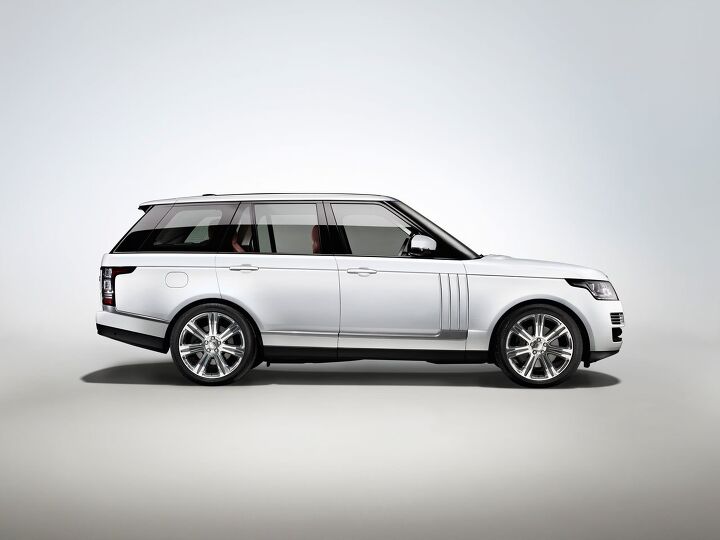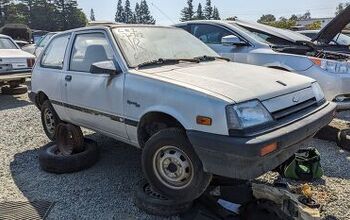About Motoring Journalists And Luxury Diesels
Recently, I spent some of my procrastinating time in Facebook discussion with a colleague, motoring journalist here in Czech Republic. He was driving a new Range Rover at the time, and he was raving about how great car it was. But there was one flaw, he said. The car came with the most common engine on our market – the TDV6 diesel. And while it didn’t really lack power and was reasonable refined, even for the luxury car it is, there was one thing it just lacked. A V8. Preferably, of the gasoline-burning kind.
Which naturally led to crucial question: Why do things like a six cylinder, diesel-powered Range Rover even exist. And why are so many people buying them? You may say that it’s a natural response to the fact that a Range Rover 5.0 V8, or the more appropriate 5.0 Supercharged, is gulping the gas in horrendous quantities, and gas is expensive in Europe. So it’s better to have the more frugal car.
But my reply will be: So what?
Let me elaborate on this a little. Imagine that you are really in the shoes of someone who can afford the Range Rover. Someone, who is either so succesful and affluent, or so fiscally careless, that he can treat himself with one of the most luxurious, most prestigious and of course also most expensive mass produced cars.
Someone who is content with the idea that his shiny, brand new Range, which cost him about the price of a small house (at least here in the Czech Republic) will be worth about a third of the price, maybe even less, when he will be selling it in some 3 years.
You buy a new Range diesel for some 130 thousand Euros, or $170k. You drive it for three years and decide that you want a new one. So you sell it, or trade it in, and get another shiny new one. A nice example of a 2010 Range Rover with some 40k miles (typical mileage of a normal European driver in three years) will fetch something like €40-45k (about $60k). And that’s a V8 one, because a V6 diesel wasn’t available then.
This means the thing cost you about 90 thousand Euros, or 120 thousand dollars, in those three years/40k miles. With simple math, we arrive to a rather staggering cost of THREE DOLLARS PER MILE. Or, put another way, a 109 dollars per day, even if the sucker is parked. Which is, even at European prices, about half a tank of gas.
And it’s the same story for other luxury SUVs, as well as posh sedans. The value drop may be a little less harsh for a sporty coupe, like a 911 or a Jag XK, or some supercar. But any “normal” luxury car will cost you dearly.
Let’s put this into some perspective. If we look at the actual fuel mileage of the current generation of Range Rovers (using great fuel economy tracking site www.SpritMonitor.de), we see that a TDV6 Rangie will need roughly 11 liters of diesel fuel for every 100 kilometers (or 62 miles) travelled. This translates to roughly 22mpg. The monstrous, ineffective gas hog that is the 5.0 Supercharged will gulp a horrendous amount of 15 liters of gasoline for the same distance. Which is about 15mpg.
So, time for more math. Gasoline is just a tiny bit more expensive in some part of Europe, while in many countries (like my homeland), it costs the same. But let’s say that a liter of gas costs a €1.50, while a liter of diesel costs €1.40. This translates in €15.40 ($20) per 100km (62 miles) for the diesel and €22.50 ($30) for the Supercharged. Which means that each mile will cost you €0.24 ($0.32) and €0.36 ($0.48) for the big one.
This makes the difference in fuel costs between the two cars a whopping DIME AND A HALF. For a vehicle which costs about three dollars a mile in depreciation costs alone, plus some more for servicing costs, tires and other stuff. Which will, in the end, make one mile worth about four dollars.
Buying a diesel car, which, however nice the modern diesels may be, is still slower and less refined than the “proper” one, will thus save you about 2.5 percent of the TCO. To me, this seems a bit like drinking Dom Perignon out of a plastic cup to save on glassware.
Of course, there are cases where diesel engines make sense for expensive cars. An A8 or a S420CDI, used for frequent business trips across Europe may easily rack those 40 thousand miles in a single year, and may well be kept around for 4 or 5 years, making the depreciation costs less significant, and the fuel costs much more important. And the same goes for hotel limos and other heavily driven cars.
But people are still buying diesels even when they don’t drive that much. Look at some European car classifieds site, like Mobile.de, and you will find surprisingly many low-mileage luxurious diesels.
Why are people doing that? Is it that the rich tend to be savvy and look at every penny? Or is it just a habit from the times when they weren’t so rich and the lower running costs of a VW TDI actually mattered? Or is it that they just hate gas stations and rather live with the worse engine, just so they don’t have to fill up so often?
My theory is different. I think that motoring journalists may be at fault.
As you probably know (especially if you read TTAC a lot), motoring hacks typically aren’t exactly rich. To make a living from driving brand new cars, travelling around the world and writing about it is so enticing a prospect in itself that it’s not necessary to pay people big bucks for doing it.
So, most of us will only experience the Range Rover or S-klasse through the relatively short, usually a week-long test. Some of us may actually buy those cars – in 10 or 20 years, when someone else already swallowed all the depreciation costs. The Range Rover costs about the same money as our apartment, and likely more than we actually make in three years. And the only expense we actually get to feel, is the price of fuel.
I’m not sure about other countries, but here in CZ, the journos usually pay for their gas. You get the obligatory full tank at the beginning of the week, some more generous magazines may provide you with fuel for photoshoots and so on, but after that, you have to fill up for your own money.
And, since average European motoring journo usually spends most of the time behind the wheel of diesel hatchbacks, diesel MPVs and other slow, unglamorous and in fact rather boring stuff, he tends to make the most of his week with an expensive car. He shows off, gives friends rides, shows what the big V8 can do. So, he racks up awful lot of miles, and since the rare experience with the powerful car has to be lived to the fullest, has a lead foot. So the Range won’t get 15mpg, like it does in the hand of someone who is accustomed to the power of the V8, but barely reaches 10. Which makes filling the 100 liter fuel tank inevitable and very, very painful.
I actually remember that one time, I voluntarily decided to exchange press Audi S5 Sportback for a lowly Skoda Fabia mid-week, solely on the grounds of the fact that in my rather “spirited” driving, the Audi got about 10mpg on average (and something like four or five when tearing the backroads – the supercharged V6 is only better than the 4.2 V8 on paper) and cost me $150 in the first two days. While the Fabia got 40 mpg and, more importantly, a tank full of gas I didn’t have to pay for.
For most journos, such experience is enough to write something along the lines of “the 5.0 Supercharged is a remarkably refined and powerful, but it will bankrupt you with fuel costs, so the six-cylinder diesel is the more prudent choice”.
But it isn’t. If you do some real job and are so succesful and affluent that you can afford a new Range Rover or A8, fuel costs will not bankrupt you. Actually, in the total cost of running such car, you won’t even feel it. And if you’re worried about the polar bears – think of all the people who won’t breathe soot from another diesel truck instead.
@VojtaDobes is motoring journalist from Czech Republic, who previously worked for local editions of Autocar and TopGear magazines. Today, he runs his own website, www.Autickar.cz and serves as editor-in-chief at www.USmotors.cz. After a failed adventure with importing classic American cars to Europe, he is utterly broke, so he drives a borrowed Lincoln Town Car. His previous cars included a 1988 Caprice in NYC Taxi livery, a hot-rodded Opel Diplomat, two Dodge Coronets, a Simca, a Fiat 600 and Austin Maestro. He has never owned a diesel, manual wagon.
More by Vojta Dobe
Latest Car Reviews
Read moreLatest Product Reviews
Read moreRecent Comments
- Mebgardner I test drove a 2023 2.5 Rav4 last year. I passed on it because it was a very noisy interior, and handled poorly on uneven pavement (filled potholes), which Tucson has many. Very little acoustic padding mean you talk loudly above 55 mph. The forums were also talking about how the roof leaks from not properly sealed roof rack holes, and door windows leaking into the lower door interior. I did not stick around to find out if all that was true. No talk about engine troubles though, this is new info to me.
- Dave Holzman '08 Civic (stick) that I bought used 1/31/12 with 35k on the clock. Now at 159k.It runs as nicely as it did when I bought it. I love the feel of the car. The most expensive replacement was the AC compressor, I think, but something to do with the AC that went at 80k and cost $1300 to replace. It's had more stuff replaced than I expected, but not enough to make me want to ditch a car that I truly enjoy driving.
- ToolGuy Let's review: I am a poor unsuccessful loser. Any car company which introduced an EV which I could afford would earn my contempt. Of course I would buy it, but I wouldn't respect them. 😉
- ToolGuy Correct answer is the one that isn't a Honda.
- 1995 SC Man it isn't even the weekend yet


































Comments
Join the conversation
Personally, I'd go for the diesel every time simply because I appreciate efficiency for the sake of efficiency. I don't CARE if it is a bit slower and costs more upfront or in maintenance, it is still faster than I need to go. I would KILL to have a diesel in MY Range Rover, because as much as I love the beast, and how ultimately useful a vehicle it is, the 12-15mpg it gets from the 4.6L V8 is borderline offensive. And that is with my driving it VERY gently, and rarely exceeding 70mph. If I drove it in a spirited manner I am sure single-digits would be the rule. By comparison, friends have a diesel Mercedes GL which when driven in a manner which will leave my truck in the dust gets 28mpg while being even bigger and heavier. It may not be as fast as a RR SC, but it is more than fast enough to get your license shredded.
What you're missing is that people like efficiency. Efficiency itself is a virtue people enjoy. It's as simple as that.